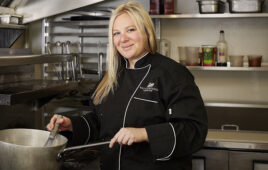Certification is useful and some credentials are quite impressive, given the amount of work that goes in to earning them, but certification is no substitute for actual skill and experience.
There’s a dizzying array of acronyms for the various certifications chefs can attain: CEC, CCA, AAC, CMC—and the list goes on.
But do these certifications prove anything? Are they valid credentials? Do the chefs who have them perform better than those who don’t?
The certification debate often gets chefs fired up. When one of the bloggers for our weekly food-and-beverage newsletter, Penelope Wong, Executive Chef of Glenmoor Country Club (Cherry Hills Village, Colo.), posed the question of whether or not club chefs should get certified, she drew a dozen detailed responses on both sides of the issue. And though Penelope ultimately earned her CEC, she’s still on the fence as to whether or not it matters.
(At the upcoming Chef to Chef Conference, to be held March 4-6, 2018 in Seattle, Wong will lead a panel discussion on the certification conundrum and other “burning issues.” Register here. Also, if you’re not getting our F&B newsletter, go here to sign up – it’s free, and full of good stuff.)
Earlier this month, we received a press release from the American Culinary Federation (ACF). My contact there wanted to point out a fascinating fact about the pool of chefs who were scheduled to take the eight-day, ACF Certified Master Chef (CMC) test from September 30 to October 7 at Schoolcraft College in Michigan.
Of the ten chefs looking to earn the CMC title this time around, six were club chefs. They included:
- Arnaud Berthelier, CEC, Executive Chef, Union Club, Cleveland, Ohio
- Gerald Ford, CEC, Executive Sous Chef, The Everglades Club, Palm Beach, Fla.
- Joseph Leonardi, CEC, Director of Culinary Operations, The Country Club, Chestnut Hill, Mass.
- Tim Recher, CEC, Executive Chef, Army Navy Country Club, Alexandria, Va.
- Seth Shipley, CEC, CCA, Executive Chef, The Gasparilla Inn & Club, Boca Grande, Fla.
- Kevin Storm, CEC, CCA, AAC, Executive Chef, Bellerive Country Club, St. Louis, Mo.
From what I know about this test, passing it is no easy feat. It takes a lot of practice and planning to prepare. And the actual week-long examination process is grueling.
For all the work they’ve done and will do, I hope we’ll find out that all of these chefs passed and earned their letters. It would be exciting to add six more CMCs to our industry (there are only a little over 70 now in total in all segments of the culinary world, with many others working in clubs, including several who will be presenting at the Seattle Chef to Chef Conference).
But again, will any of this matter to the members of clubs with chefs who are CMCs? Will it make the food at their club any better? Time will tell.
In my opinion, the certification alphabet is useful and some credentials are quite impressive, given the amount of work that goes in to earning them. But certification is no substitute for actual skill and experience, which I think counts for more than whether or not you passed a one-time test.
That said, once passed, there is a level of expectation that continues to push certified chefs to evolve and improve. Clearly that’s worthwhile, especially in clubs where the demands on a chef are much different than in restaurants or other parts of the food world.
Perhaps that’s why so many of the chefs who are now taking the CMC exam come from clubs: You are uniquely positioned to demonstrate your culinary competency in this arena, because every day on the job is a test of your skill, knowledge and professionalism.
And every time you satisfy your members, you earn the best passing grade of all.



